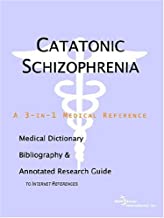Schizoprenia
Catatonic schizophrenia, rare severe mental disorder characterized by striking motor behaviour, typically involving either significant reductions in voluntary movement or hyperactivity and agitation. In some cases, the patient may remain in a state of almost complete immobility, often assuming statuesque positions.
Clstr1:
Wik1 W037:
Diagnoses Schizophrenia (Out of aphpabetical order, but there is no entry for “Catatonic Schizophrenia.”)
USPatnts: 0.3-0.7%
WrldPatnts: 20 Mil
SexRatio: M1.5; F
AveOnset: Ages 16-30
Brain Area: insufficient dopamine to motivate; dopamine & glutamate; thinning of brain gyrus; being left handed
Symptoms: persecutory hallucinations (usually hearing), delusions (incorrect ideas), confused thinking; speaking in “word salad”
Progression & Effects: contact often lost with the outside world. 10% become violent = 4X general population
Causes: many genes and adverse childhood experiences; urban =2X; ½=drug use, including cannabis-2+X
Productive Medications: antipsychotics; social supports; 1/3 are “treatment resistant”, exercise, 3,000 new drugs in development
Productive Therapies: ½ improve over time, some with no relapses. Others, lifelong, frequent hospitalization, 5% suicides, 20 years shorter life
Clstr4:
Wik4:
Patient Organizations:
Researchers&Hospitals:
Celebrities
Other:
Youtube Video: Catatonic Schizophrenia
Amazon or Library Book: Catonic Schizophrenia (Published, 2004)
Click the book to link or order from Amazon.

